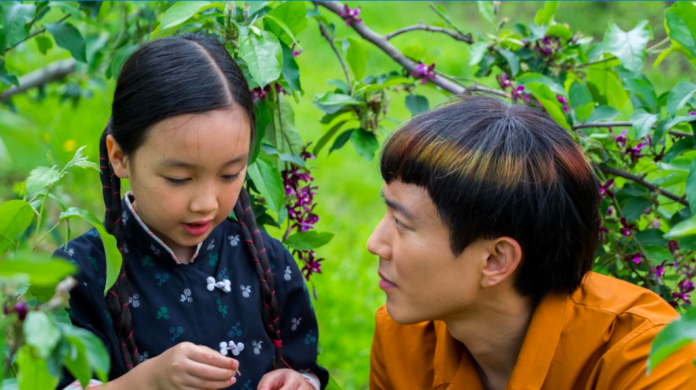By Pen Fang
Descriptions of some scenes are used. There may be spoilers.
After Yang follows a family set in a sci-fi world, consisting of two parents, Kyra (Jodie Turner-Smith) and Jake (Colin Farrell), their adoptive daughter, Mika (Malea Emma Tjandrawidjaja), and the android/“technosapien” Yang (Justin H. Min) that was purchased by the parents to help teach Mika about her Chinese heritage. But Yang suddenly malfunctions, and the family is left to pick up the pieces and find their ways to move forward from there. It was adapted from the short story Saying Goodbye After Yang, After Yang by Alexander Weinstein.
The movie soars on a technical aspect. Director Kogonada’s care for his films can be seen through the camera lens; Benjamin Loeb’s cinematography has such a richness to it, and the beauty of each shot seeps through the screen. The score, done by Aska Matsumiya and Ryuichi Sakamoto, further elevates the movie—from the song to the opening credits to the closing scene, it adds a layer of emotion, gorgeous and at times, haunting. It also features a cover of “Glide” from All About Lily Chou-Chou done by Mitski.
Something I really enjoyed was the movie’s presentation of the tangibility of loss. Yang is gone, but his body and his memories, as discovered by Jake, are still very there. He is still there, the literal representation of how present grief is. “There is something without nothing,” Yang says in a conversation with Kyra. He is revived in their minds, the memory of him leaving its mark on everyone in the family and more. After Yang is, in part, a contemplation of loss: what does it mean to lose somebody? And how do you heal?
It also explores the theme of family, and how bond is thicker than blood. Yang himself perhaps explains it best when he tells Mika about tree grafting: letting the branch of a tree grow with a different tree, which emphasizes that although the branch may not be part of the tree originally, it grows and becomes part of it. How a true family is held together with connection. After Yang dissects family relationships, exploring the connections between characters with empathy and care. Other themes include memory, technology, and humanity.
But perhaps the most intriguing theme for me was the exploration of Asian identity. Yang is originally purchased by Jake and Kyra to help connect Mika with her Chinese heritage. Because of this, he is designed to look like a Chinese man and has knowledge on “Chinese fun facts” to help Mika, but he questions whether that makes him Chinese or not.
Kogonada said, “There’s such a history of Orientalism in Western media’s engagement of the East — it’s something that’s often fetishized, and there’s so much literature deconstructing that… As an Asian filmmaker, I wanted to tackle that in a different way, because my own struggle with my Asian identity often is in the world of its construction: Do I perceive myself as Asian, not Asian enough, too Asian? And there’s no solid ground for that identity, especially if you’ve been dislocated, so we have to contend with the way that Asia and Asians have been presented. There’s no avoiding Orientalism for an Asian.”
There is a scene in the film where Jake, who runs a tea store, is talking to Yang. Jake mentions that tea originated in China and then makes tea for Yang. Jake drinks the tea and searches for something within it, in contrast to Yang, who has no reaction. And Yang then says, “I wish Chinese tea wasn’t just about facts for me. I like watching the way you make tea. It’s very beautiful. The way the leaves bloom, and float, and fall. I wish I felt something deeper about tea. I wish I had a real memory of tea in China. Of a place. Of a time.” And it is through Yang that the question is asked: what does it mean to be Asian?










